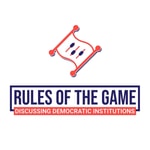Rules of the Game – discussing democratic institutions – Détails, épisodes et analyse
Détails du podcast
Informations techniques et générales issues du flux RSS du podcast.

Rules of the Game – discussing democratic institutions
Stephan Kyburz
Fréquence : 1 épisode/28j. Total Éps: 54

Classements récents
Dernières positions dans les classements Apple Podcasts et Spotify.
Apple Podcasts
🇩🇪 Allemagne - government
25/05/2025#90🇩🇪 Allemagne - government
24/05/2025#78🇩🇪 Allemagne - government
23/05/2025#62🇩🇪 Allemagne - government
22/05/2025#41🇩🇪 Allemagne - government
26/02/2025#85🇩🇪 Allemagne - government
25/02/2025#58🇩🇪 Allemagne - government
24/02/2025#40🇩🇪 Allemagne - government
23/02/2025#23🇩🇪 Allemagne - government
22/02/2025#61🇩🇪 Allemagne - government
21/02/2025#49
Spotify
Aucun classement récent disponible
Liens partagés entre épisodes et podcasts
Liens présents dans les descriptions d'épisodes et autres podcasts les utilisant également.
See all- https://www.politicsinquestion.com/
39 partages
- https://www.buymeacoffee.com/rulesofthegame
36 partages
- https://www.worldbank.org/
30 partages
- https://twitter.com/leedrutman
4 partages
- https://twitter.com/claudiaheiss
4 partages
- https://twitter.com/CynthiaRTerrell
4 partages
- https://youtu.be/cFKoTCRzw80
3 partages
- https://youtu.be/sR_kOOB4N6U
2 partages
Qualité et score du flux RSS
Évaluation technique de la qualité et de la structure du flux RSS.
See allScore global : 48%
Historique des publications
Répartition mensuelle des publications d'épisodes au fil des années.
Double Proportionality with Friedrich Pukelsheim
Épisode 45
jeudi 14 novembre 2024 • Durée 01:00:01
With Friedrich Pukelsheim I discuss double proportional representation. Since 2006 the Canton of Zurich in Switzerland uses double proportionality to elect its 180 members of parliament. Friedrich Pukelsheim was invited to design an electoral system that would deliver on the promise of overall proportional representation in the canton while keeping the existing electoral districts since they are meaningful social and geographic entities. The complication is that some of these districts are very small (4 seats) while others are large (up to 18 seats). So the problem to be solved was to achieve proportional representation and electoral equality while honoring those very diverse districts.
The resulting electoral system was double proportionality, nicknamed “Doppelter Pukelsheim” (“Double Pukelsheim”). Friedrich Pukelsheim has become well-known across Switzerland thanks to his successful design of an electoral system that fits the Zurich's requirements. He emphasizes, however, that the system was first discovered by Michel Balinski. As of now, 8 cantons in Switzerland have adopted a double proportional representation system.
Friedrich Pukelsheim is Professor Emeritus of Mathematics at the University of Augsburg in Germany. He got his doctoral degree in 1977 from the University Albert-Ludwigs University in Freiburg, and a Habilitation in 1982 from the same University. Still in the same year he became professor of mathematics and he has over time developed a special interest in the mathematical intricacies of electoral systems. Throughout his career he had research stays at the universities of Stanford, Cornell, Penn State, the London School of Economics and Political Science, among many others. Two books that treat the design of proportional electoral systems are Proportional Representation – Apportionment Methods and Their Applications, first published in 2014, and one in German: Sitzzuteilungsmethoden – Ein Kompaktkurs über Stimmenverrechnungsverfahren in Verhältniswahlsystemen, published in 2016. You can find all of his contributions on his website. You find links to all references in the show notes.
As a remark, this conversation was recorded in July 2024.
Find a full transcript and links to all material discussed in the show notes.
Schedule: 00:00 Introduction / 04:03 Personal questions / 6:08 Main discussion / 52:50 Recommendations by Friedrich Pukelsheim.
Find Friedrich Pukelsheim’s research here.
Please send feedback to rulesofthegame.ddi@gmail.com. If you find my discussions interesting and you’d like to support my work, consider buying me a coffee at buymeacoffee.com/rulesofthegame.
Many thanks to Ana Margarida Santos who co-produced this episode.
Please enjoy this conversation with Friedrich Pukelsheim.
The System of International Aid with Degan Ali
Épisode 44
dimanche 25 août 2024 • Durée 46:37
With Degan Ali I discuss the system of international aid based on her inside experience of working in the sector for over two decades. She speaks truth to power and that really takes some bravery to do, and I honor that. Degan Ali shares many compelling stories from her home country Somalia, but also from several years of growing up and studying in the US. She explains how local agricultural markets were destroyed by foreign interference and how the Somali government is at the whim of foreign donor countries, instead of being accountable to its own people.
Listening to her perspective is really important and powerful, even though I don’t agree with all her viewpoints. With her voice and her work she tries to find ways to liberate Somalia from the traditional aid paradigm. As it is pointless to wait for the international aid system to change or even to leave Somalia, what seems the most promising way forward is to empower local civil society organizations and to raise their political profile to increase their leverage on the political stage.
Degan Ali has been at the forefront of shifting power for decades. She is the Executive Director of Adeso, an organization that made cash transfers a significant, legitimate method of delivering aid to vulnerable populations, beginning with the first large-scale cash transfer program during the 2011 Somalia famine. She is also a Rockefeller Foundation Global Fellow for Social Innovation, a contributor to the Overseas Development Institute, the Humanitarian Policy Group and the Global Food Security Journal. Her work has been featured on The New York Times, Al Jazeera and The Guardian.
As a remark, this conversation was recorded in June 2023.
Find a full transcript and links to all material discussed in the show notes.
Schedule: 00:00 Introduction / 04:57 Personal questions / 13:41 Main discussion / 42:46 Recommendations by Degan Ali.
Follow Degan Ali on X.
Please send feedback to rulesofthegame.ddi@gmail.com. If you find my discussions interesting and you’d like to support my work, consider buying me a coffee at buymeacoffee.com/rulesofthegame.
Many thanks to Ana Margarida Santos who co-produced this episode.
Please enjoy this conversation with Degan Ali.
Fixing the House with Proportional Representation with Lee Drutman
Épisode 39
jeudi 30 mars 2023 • Durée 44:18
With Lee Drutman I discuss how proportional representation can break the two-party doom-loop that is spiraling in the U.S. Lee co-founded the organization “Fix Our House” with Charlotte Hill and Eli Zupnick, that specifically campaigns for proportional representation for the U.S. House of Representatives. We spend less time talking about the problems of the outdated first-past-the-post system, yet more time on possible solutions. Lee’s favored electoral system is open-list proportional representation, that is also used in Switzerland, for instance. He explains why he changed his mind on ranked choice voting, that he previously vouched for. We agree that the most important message for the electoral reform movement right now is advocating for multi-seat districts and proportional representation, instead of being bogged down by arguing over the best version of PR.
Lee Drutman is a Senior Fellow in the Political Reform program at New America. He is the author of the books “Breaking the Two-Party Doom-Loop: The Case for Multi-Party Democracy in America”, and “The Business of America is Lobbying “. He is the winner of the 2016 American Political Science Association's Robert A. Dahl Award, given for "scholarship of the highest quality on the subject of democracy." He co-hosts the podcast Politics in Question, and he is a lecturer at The Johns Hopkins University Center for Advanced Governmental Studies, and he writes regularly for FiveThirtyEight. He has published numerous pieces in the New York Times, Washington Post, Vox, NBC Think, and Foreign Policy, among many other outlets. He holds a Ph.D. in political science from the University of California, Berkeley and a B.A. from Brown University.
Find a full transcript and links to all material discussed in the show notes.
Schedule: 00:00 Introduction / 04:17 Personal questions / 05:15 Main discussion / 42:23 Recommendations by Lee Drutman.
Follow Lee Drutman on Twitter and LinkedIn.
Please send feedback to rulesofthegame.ddi@gmail.com. If you find my discussions interesting and you’d like to support my work, consider buying me a coffee at buymeacoffee.com.
Many thanks to Ana Margarida Santos who edited the episode.
Please enjoy this wide ranging conversation with Lee Drutman.
Music credits: To Be A Ball Of Light by Late Night Feeler and Fantasy Classical Themes by TheoTe.
Rules in Perspective on Ep. 38: Political Institutions of Kuwait | By Stephan Kyburz
lundi 27 mars 2023 • Durée 08:45
Rules in Perspective is a new segment on the Rules of the Game channel. In this new segment I review and comment on my own podcast episodes.
In this episode of Rules in Perspective I review the podcast episode 38 on Political Institutions of Kuwait with Luai Allarakia.
My three takeaways:
- Re-read the constitution
- Procedural rules matter too
- Political parties are important
Listen to episode 38 and find the show notes here.
Find more information on the role of political parties in this paper on Moderated Parliamentarism.
Related Episodes:
Parliamentarism vs. Presidentialism with Tiago Santos (Ep. 11)
Beyond Presidentialism and parliamentarism with Steffen Ganghof (Ep. 16)
Moderated Parliamentarism with Tarunabh Khaitan (Ep. 29)
It would be great to hear your opinion and feedback on this new format. If you want to send me an email, you can reach me at rulesofthegame.ddi@gmail.com. If you find my discussions interesting and you’d like to support my work, consider buying me a coffee at https://www.buymeacoffee.com/rulesofthegame
Political Institutions of Kuwait with Luai Allarakia
Épisode 38
dimanche 5 mars 2023 • Durée 58:05
With Luai Allarakia I discuss Kuwait’s political system and institutions. He lays out the most important developments since its constitution was written in 1962, and how Kuwait – a country of 4.3 million people – tries to manage its political trajectory between presidentialism and parliamentarism. It is following its own path, that is led by a hereditary monarch, the emir of Kuwait. While a lot of power is concentrated in the emir, who can appoint the prime minister, the National Assembly of Kuwait, or KNA in short, is elected by the people. Elections are a national sport in Kuwait, says Luai.
He shares with us many institutional features and rules that may seem very specific to Kuwait, but are interesting to compare to other political systems. In the end, you realize that the system is based on many different written and unwritten rules and norms – like any political system.
So in this conversation we really take the time to go into some detail of Kuwait’s institutions and I think it’s really worth it to talk about the specificities that are partly similar and partly different from a well-established democracy.
Luai Allarakia is Visiting Assistant Professor of Political Science at the University of Richmond in the US. He got his PhD in Political Science and Government from the University of Houston, where he wrote his thesis on the Dynamics of Legislatures in Monarchical Regimes, exemplified by Kuwait’s National Assembly (KNA). His research specializes in Kuwait’s legislature, the Saudi Shura Council, and Gulf Arab affairs. He also regularly comments on political developments in the Gulf states. You can follow him on Twitter and Linkedin and link to his profiles in the show notes.
Find a full transcript and links to all material discussed in the show notes.
Schedule: 00:00 Introduction / 03:34 Personal questions / 06:28 Main discussion / 54:20 Recommendations by Luai Allarakia.
Luai Allarakia's contributions at the Arab Gulf States Institute.
Follow Luai Allarakia on Twitter and Linkedin.
Please send feedback to rulesofthegame.ddi@gmail.com. If you find my discussions interesting and you’d like to support my work, consider buying me a coffee at buymeacoffee.com.
Many thanks to Ana Margarida Santos who edited the episode.
Please enjoy this wide ranging conversation with Luai Allarakia.
Music credits: To Be A Ball Of Light by Late Night Feeler and Fantasy Classical Themes by TheoTe.
Rules in Perspective on Ep. 37: Proportional Representation in Canada | By Stephan Kyburz
samedi 25 février 2023 • Durée 09:13
Rules in Perspective is a new segment on Rules of the Game – discussing democratic institutions. In this new segment I review and comment on my own podcast episodes.
In this episode of Rules in Perspective I review the podcast episode 37 on Advancing Proportional Representation in Canada with Réal Lavergne.
My three takeaways:
- Broken promises
- Lost referendums
- Citizens’ assemblies as a reform strategy
Listen to episode 37 and find the show notes here.
Find more information about Fair Vote Canada.
Related Episodes:
The Dream of a Truly American Democracy (Ep.1)
Proportional Representation in America? with Jack Santucci (Ep. 12)
New Zealand's Electoral Reform with Jack Nagel (Ep. 30)
It would be great to hear your opinion and feedback on this new format. If you want to send me an email, you can reach me at rulesofthegame.ddi@gmail.com. If you find my discussions interesting and you’d like to support my work, consider buying me a coffee at https://www.buymeacoffee.com/rulesofthegame
Advancing Proportional Representation in Canada with Réal Lavergne
Épisode 37
jeudi 16 février 2023 • Durée 38:44
The story of proportional representation in Canada is one of great hopes, changes in reform strategies, but also – unfortunately – many broken promises. So the country is still stuck with the outdated first-past-the-post electoral system at all levels of government.
With Réal Lavergne I discuss the efforts of Fair Vote Canada to push for electoral reform. He shares the frustrations and problems that come with the first-past-the-post electoral system and how Fair Vote Canada tries to bring change to the balance of power. While most people seem to be aware of the defects of elections in Canada, to introduce proportional representation through electoral reform is extremely difficult.
Réal Lavergne was President of Fair Vote Canada from 2016 to 2021 and is well versed with the experiences of advocating for proportional representation in Canada. Réal is an economist by training and got his PhD in Political Economy from the University of Toronto. Before starting to work as a volunteer for Fair Vote Canada, he spent many years in International Development.
Find a full transcript and links to all material discussed in the show notes.
Schedule: 00:00 Introduction / 03:20 Personal questions / 07:40 Main discussion / 35:20 Recommendations by Réal Lavergne.
Find out more about Réal Lavergne at Fair Vote Canada.
Find out more Fair Vote Canada.
Follow Réal Lavergne on LinkedIn.
Please send feedback to rulesofthegame.ddi@gmail.com. If you find my discussions interesting and you’d like to support my work, consider buying me a coffee at buymeacoffee.com.
Please enjoy this wide ranging conversation with Réal Lavergne.
Music credits: To Be A Ball Of Light by Late Night Feeler and Fantasy Classical Themes by TheoTe.
Rules in Perspective on Ep. 36: Direct Democracy in Germany | By Stephan Kyburz
mardi 14 février 2023 • Durée 12:55
Rules in Perspective is a new segment on Rules of the Game – discussing democratic institutions. In this new segment I review and comment on my own podcast episodes.
In this episode of Rules in Perspective I review the podcast episode 36 on Current Developments of Direct Democracy in Germany with Jan Renner.
My three takeaways:
- On the people's initiative in Bavaria
- On citizens' assemblies and direct democracy
- On the history of direct democracy in Germany
Listen to episode 36 and find the show notes here: https://rulesofthegame.blog/current-developments-of-direct-democracy-in-germany/
Referenced paper by Andreas Rohner (2011): https://www.zora.uzh.ch/id/eprint/94811/1/C2D_WP38.pdf
Mehr Demokratie (More Democracy) Germany: https://www.mehr-demokratie.de/english
It would be great to hear your opinion and feedback on this new format. If you want to send me an email, you can reach me at rulesofthegame.ddi@gmail.com. If you find my discussions interesting and you’d like to support my work, consider buying me a coffee at https://www.buymeacoffee.com/rulesofthegame
Related Episodes:
Basic Principles of Direct Democracy with Stefan Schlegel (Ep. #5)
Website: https://rulesofthegame.blog/basic-principles-of-direct-democracy/
Spotify: https://open.spotify.com/episode/1sFM0MpgIfHDdsJ1P2Gca3?si=vdZJSOePSFGCaIXnLH2zcw
Youtube: https://youtu.be/cFKoTCRzw80
Directer Democracy with Roslyn Fuller (Ep. #13)
Website: https://rulesofthegame.blog/directer-democracy/
Spotify: https://open.spotify.com/episode/0qNodiEb0v4bTcKH7UCEix?si=8D_e9_0cRj6M-DpO2VhMTg
Youtube: https://youtu.be/sR_kOOB4N6U
Deliberative Democracy and Citizens’ Assemblies with Ian O'Flynn (Ep. #22)
Website: https://rulesofthegame.blog/deliberative-democracy-and-citizens-assemblies/
Spotify: https://open.spotify.com/episode/3hrBuTGWFz5VNEspqLm7kj?si=DDX7EamKR6-e6eWHVw9dvQ
Let the People Rule with John Matsusaka (Ep. #31)
Website: https://rulesofthegame.blog/let-the-people-rule/
Spotify: https://open.spotify.com/episode/522DYytyyZT79XGj0LMydf?si=yjFdxHtsRY2D_9Bd2Ui8Kw
Current Developments of Direct Democracy in Germany with Jan Renner
Épisode 36
mardi 7 février 2023 • Durée 51:31
With Jan Renner I discuss current developments of direct democracy in Germany, and especially in Bavaria, his home state. Bavaria is the most advanced German federal state when it comes to direct democracy. Jan explains the specific direct democratic tools that are available and how Mehr Demokratie, the organization he works for, tries to change the rules of direct democracy to make citizen participation and decision making easier and better. He shares with us the strategies they pursue and obstacles they face.
As Germany is indeed a vibrant direct democracy at the communal and regional level, we talk about developments of direct democracy in the various states. Yet, Germany is still the only EU country that has not yet seen a nationwide referendum. We dig into the historical reasons for this fact and discuss the options for citizen participation, and pushbacks against direct democracy at the federal level.
Jan Renner is the Executive Director of Mehr Demokratie (More Democracy) in Bavaria. What I love about his story is how he became a young activist for direct democracy when he joined protest movements that made him more aware of what is wrong with the political system and so he joined the organization for more democracy and climbed its ranks. Jan studied Political Science, Sociology and History in Augsburg and Oslo.
Show notes with a full transcript and links to all material discussed: https://rulesofthegame.blog/current-developments-of-direct-democracy-in-germany/
Schedule: 00:00 Introduction / 03:20 Personal questions / 09:27 Main discussion / 48:14 Recommendations by Jan Renner.
Find out more about Jan Renner here: https://bayern.mehr-demokratie.de/ueber-uns/mitarbeiter-innen
Find out more about Mehr Demokratie Germany (More Democracy): https://www.mehr-demokratie.de/
Please send feedback to stephan.kyburz@gmail.com. If you find my discussions interesting and you’d like to support my work, consider buying me a coffee at https://www.buymeacoffee.com/rulesofthegame
Many thanks to Ana Margarida Santos who edited the episode.
Please enjoy this wide ranging conversation with Jan Renner.
Music credits: To Be A Ball Of Light by Late Night Feeler and Fantasy Classical Themes by TheoTe.
Women Facing Brazilian Institutions with Larissa Peixoto Gomes
Épisode 35
mercredi 25 janvier 2023 • Durée 52:13
Women in Brazil have consistently been underrepresented in politics. What are the reasons for this lack of women’s political power in this vast democracy? How do formal and informal institutions hinder fair representation of women? How could the political system be changed to reflect the true interest and character of Brazilian society?
With Larissa Peixoto Gomes I discuss Brazilian democratic institutions from a feminist perspective. Based on her research and personal experiences, she shares with us the difficulties that women in politics face and how institutions and conditions make it hard for them to win political office. We review the Brazilian open-list proportional representation electoral system and the federal structure. Larissa has a pointed opinion about how institutions should be changed to make the political system work for all citizens and all government levels. And she explains why money has such a significant influence on political power.
Larissa Peixoto Gomes is a researcher at the Wales Governance Centre of Cardiff University. She received her PhD in Political Science from the Federal University of Minas Gerais, Brazil. In her PhD thesis she compared the substantive representation of women in Brazil, the United Kingdom, and Sweden. Her research is focused on political institutions, political representation, elections, gender, and ethnic minorities. She regularly contributes to the public discussion of democratic institutions and women in politics. So for anyone interested in the latest developments in Brazilian politics, she is definitely a great resource, and I link to her website and Twitter in the show notes.
Show notes with a full transcript and links to all material discussed: https://rulesofthegame.blog/women-facing-brazilian-institutions/
Schedule: 00:00 Introduction / 03:24 Personal questions / 06:43 Main discussion / 45:22 Recommendations by Larissa Peixoto Gomes.
Find more of Larissa’s work and research on her website: https://www.larissapeixoto.com/
Follow Larissa on Twitter: https://twitter.com/larissapolitics
Please send feedback to stephan.kyburz@gmail.com. If you find my discussions interesting and you’d like to support my work, consider buying me a coffee at https://www.buymeacoffee.com/rulesofthegame
Many thanks to Ana Margarida Santos who edited the episode.
Please enjoy this wide ranging conversation with Larissa Peixoto Gomes.
Music credits: To Be A Ball Of Light by Late Night Feeler and Fantasy Classical Themes by TheoTe.








